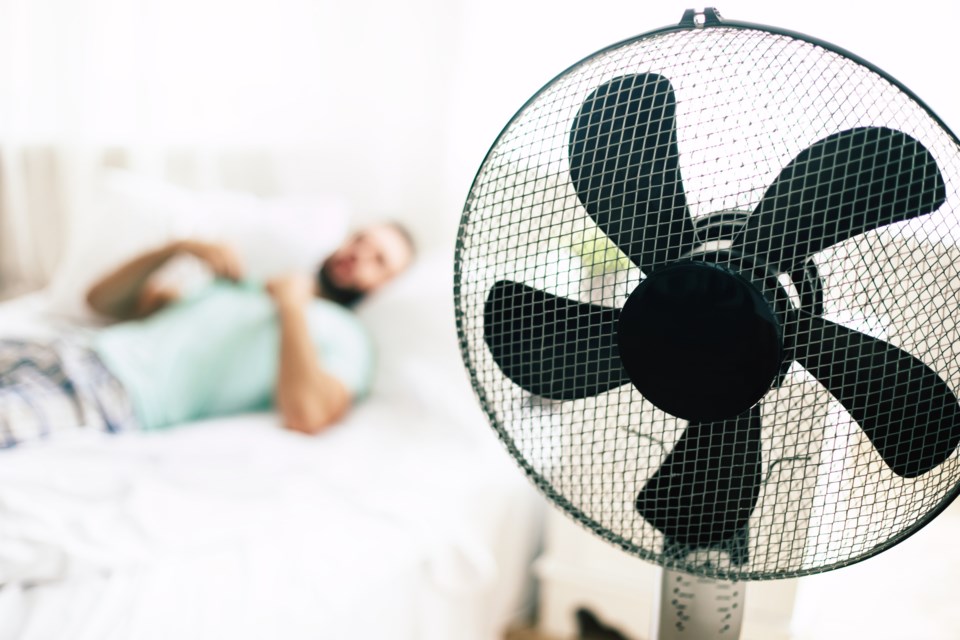With the first high temperatures of the summer hitting Metro Vancouver and the Fraser Valley today, Fraser Health officials are offering up some advice for getting ready for the heat.
Temperatures are forecast to reach 28 C in Burnaby by Saturday, June 25, with a potential high of 32 C by Monday, while New Westminster faces a projected 30 C tomorrow and 31 C by Monday. Environment Canada has issued a special weather statement for Metro Vancouver starting today (Friday, June 24) and extending through until Monday.
Though the statement isn't the same as an "extreme heat" warning, Fraser Health notes that the first heat of the season can require more vigilance because we're not yet acclimatized to the warmer weather. So here, for this weekend and beyond, are some ideas for staying cool.
How to prepare your home ahead of time for hot weather
- Identify a cooler space in your home and prepare it so you can stay there at night, if possible. You may need to change daily living arrangements.
- Find an air-conditioned spot close by where you can cool off on very hot days. Consider staying with friends or family or find places in your community to spend time such as movie theatres, libraries, community centres or shopping malls.
- Check that you have a working fan. If you have an air conditioner, make sure it works.
- Install awnings, shutters, blinds or curtains over your windows to keep the sun out during the day.
- Practice opening doors and windows to move cool air in at night and shutting windows during the day to prevent hot outdoor air from coming inside.
- Get a digital room thermometer to keep with you so you know when your home is getting too hot.
Reach out to those most at risk from the heat: Who's vulnerable?
It is important to monitor yourself and family members, and to develop a check-in system for neighbours and friends who are at higher risk during warmer weather.
The most susceptible individuals include:
- older adults, especially those over 60
- people who live alone
- people with pre-existing health conditions such as diabetes, heart disease or respiratory disease
- people with mental illnesses such as schizophrenia, depression, or anxiety
- people with substance use disorders
- people with limited mobility
- people who are marginally housed
- people who work in hot environments
- people who are pregnant
- infants and young children
How to protect your health in hot weather
- Spray your body down with water, wear a damp shirt, take a cool shower or bath, or sit with part of your body in water to cool down if you are feeling too hot.
- Drink plenty of water and other liquids to stay hydrated, even if you are not feeling thirsty
- Take it easy, especially during the hottest hours of the day.
- Stay in the shade or use a broad spectrum sunscreen with SPF 30 or more.
- Signs of overheating include feeling unwell, headache and dizziness. Take immediate action to cool down if you are overheating. Remember that overheating can lead to heat exhaustion and heat stroke.
- Signs of heat exhaustion include heavy sweating, severe headache, muscle cramps, extreme thirst and dark urine. If you are experiencing these symptoms, you should seek a cooler environment, drink plenty of water, rest and use water to cool your body.
- Heat stroke is a medical emergency.
When to call 911 (and when not to) in the heat
In the event of a medical emergency, British Columbians are advised to call 911. However, it is also important to use 911 responsibly to avoid overwhelming the system.
Ahead of the busy summer months, B.C. Emergency Health Services, in partnership with ECOMM, is reminding British Columbians to only dial 911 for serious or life-threatening injuries.
When you should call:
- In general: when there is chest pain, difficulty breathing, loss of consciousness, severe burns, choking, convulsions that are not stopping, a drowning, a severe allergic reaction, a head injury, signs of a stroke, a major trauma.
- More specifically related to hot weather: severe headache, confusion, unsteadiness, loss of thirst, nausea/vomiting and dark urine or no urine are signs of dangerous heat-related illness.
If you have a less urgent health issue:
- You can call 811 and get connected with a nurse at HealthLinkBC. Or, if you can do it safely, you could go to an urgent care centre or clinic.
- You can use HealthLinkBC's online tools, including a Check Your Symptoms tool.
More information on preparing for extreme heat events can also be found in BC’s Extreme Heat Preparedness Guide.
Follow Julie MacLellan on Twitter @juliemaclellan.
Email Julie, [email protected].



